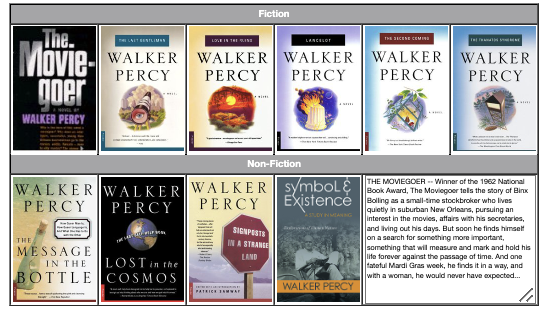A Walker Percy Primer
An introduction to Walker Percy, including his achievements as a writer
Who is Walker Percy?
— Throughout his writings, Walker Percy combines art, philosophy, and science to create a striking, if not provocative "diagnostic" approach to understanding human experience...
A nationally acclaimed late-20th century American author, Walker Percy (1916-1990) contributed a large body of literary, critical, and philosophical commentary to the arts and humanities. Frequently referred to as a "novelist-of-ideas," he employs a humorous approach to his characters and the serious predicaments they find themselves in.
Originally trained in the sciences as a medical doctor, Percy received the 1962 National Book Award for his first and best-known novel, The Moviegoer. His novels and non-fiction writings address the peculiar situation that is the human condition. In all, he published six novels during his writing career in Louisiana, with his novels being set in the South. In addition, he published four non-fiction books of essays and philosophical writings.
Percy read widely from the philosophical school of Existentialism advanced by a variety of European writers as one influence, including the Danish philosopher Soren Kierkegaard. Existentialism holds, in part, that questions about morality, aesthetics, and the meaning of life cannot be answered by science. Percy explores these topics throughout his novels, essays, and interviews. He also held a fascination with the philosophical nature of language.
Key themes in Percy's writings include: (1) the alienation of the individual in the face of "scientism" as a worldview; (2) the human search for meaning, authenticity, and community; (3) the decay of traditional values in society; and (4) the role of language in our awareness of the world. These themes confirm Percy's relevance for future generations of readers.
As capstone to his writing career, in 1989 Percy received the Jefferson Lecturer in the Humanities, the highest U.S. Government award recognizing life-time achievement in the humanities (View video). Taken as a whole, Percy's fiction, literary themes, and supporting philosophical writings assures that a careful reading of his work will prove both enriching and challenging.
Video: "Walker Percy on The Southern Review (50th Anniversary, 1985)
TRT: 0:37" - Credit Unknown
"A Walker Percy Primer" True-False Quiz
Take the fun 12 question True-False Quiz to review your knowledge after reading The Project's
Walker Percy's Books
For an educational presentation where you can read brief descriptions of Walker Percy's books, view the Project's Interactive Book Collage and click on any book icon.
Awards and Honors
- Jefferson Lecturer in the Humanities, National Endowment for the Humanities, Washington, DC, Spring, 1989
- The Laetare Medal, 1989
- The Fellowship of Southern Writers, 1987
- Fellow, American Academy and Institute of Arts and Letters
- T.S. Eliot Award for Creative Writing, Ingersoll Foundation, 1988
- The Campion Award, 1986
- St. Louis Literary Award, 1986
- Los Angeles Times Book Prize for current interest, 1983, Lost in the Cosmos: The Last Self-Help Book
- P.E.N./Faulkner Award nomination, 1981, The Second Coming
- Notable Book citation from American Library Association, 1981, The Second Coming
- American Book Award nomination, 1981, The Second Coming
- National Book Critics Circle, citation, 1980, The Second Coming
- Los Angeles Times Book Prize, 1980, The Second Coming
- National Institute of Arts and Letters grant, 1967
- National Book Award nomination, 1966, The Last Gentleman
- National Book Award for fiction, 1962, The Moviegoer
Selected Periodicals
Harper's, Esquire, Vanity Fair, New York Times, Southern Review, Georgia Review, Saturday Review, Michigan Quarterly Review, New Scholasticism, Thought, Personalist, Commonweal, America.

